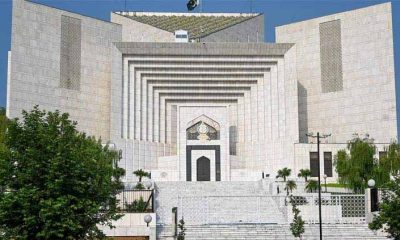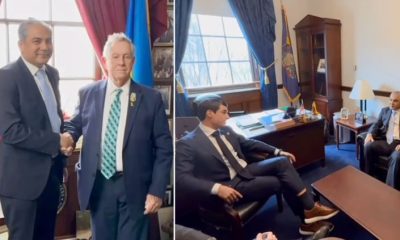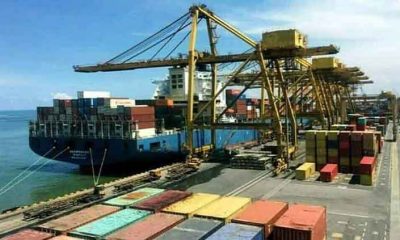World
In Channel, major resources track small boats

Fifteen months after 27 migrants drowned in the Channel, the efforts to prevent another tragedy are visible from the bridge of the French navy boat BSAM Rhone as it patrols on a cold February night.
The 70-metre warship is one of two extra vessels ordered late last year by the French government to join monitoring and rescue operations in the busy waters off the port of Calais from where most migrants leave for England.
On the night of February 9, it spent more than three hours shadowing a packed inflatable dinghy as it weaved between container ships and ferries in the inky blackness, heading for the lights of England on the horizon.
“Our job is to make sure it doesn’t get hit,” says Gaspard, the officer on watch, as he keeps an eye on the radar and makes sure his ship is a steady one kilometre (0.6 miles) behind the inflatable and its dozens of passengers.
A look-out checks regularly on its progress with infra-red binoculars.
Overhead, a surveillance plane from the European Union border force Frontex can be seen doing loops. A grey Belgian navy vessel stands on alert nearby.
Shortly after midnight, after a bone-chilling journey of around five hours in total, the dinghy crosses the international boundary and enters British waters.
Following the instructions passed on to them by people smugglers, someone on board makes an SOS call.
The powerful BSAM Rhone is being used to shadow tiny inflatables
The Volunteer, a UK Border Force vessel positioned nearby, then swoops in to pick them up, its powerful lights illuminating the gently rolling waves.
It’s a familiar routine for the onlooking French.
“Once they’re in British waters, they’ve reached their target,” says captain Enoal Gabriel. “If they need saving while they’re in French waters, then we’re there and we take them back to France.”
– ‘Stop the boats’ –
Around 46,000 asylum seekers crossed the Channel last year in this way — mostly Afghans, Iranians and Albanians.
This compared with almost none in 2017, before the seaborne route to Britain became the favoured option for migrants.
Around 8,000 were rescued in French waters.
The surge in numbers has left the British government vowing to stem the flow and the French determined not to see a repeat of the November 2021 tragedy that left 27 dead and a deep well of distrust between the neighbouring countries.
The number of migrants crossing the Channel has soared over the last five years
On that night, a dingy deflated near the international maritime boundary. Overwhelmed coastguard services on both sides passed the buck as people drowned.
The incident and four more deaths in late 2022 were the backdrop to the deployment of the 3,000-tonne BSAM Rhone, which is big and powerful enough to tow an aircraft carrier but is now being used to shadow tiny inflatables.
One of the 28 crewman on board grumbles privately that he can’t wait until the French state follows through on plans to charter two private vessels to replace the sophisticated navy assets.
“We have lots of other missions we could be getting on with,” he says, asking not to be named.
The monitoring and rescue operations have also drawn crossfire in Britain, where Prime Minister Rishi Sunak is weighing up radical new plans to “stop the boats”.
He reportedly favours mass deportations as a deterrent but has not revived an idea of pushing migrant dinghies back into French waters which was once floated by former interior minister Priti Patel.
Some right-wing media have accused the French of “guiding” migrants to British waters.
Anti-immigration politicians also regularly describe UK Border Force vessels as acting like “a taxi service” by bringing them ashore.
– Policing –
France presently has six vessels in the Channel around Calais to monitor the dinghies, up from four at the end of last year.
Despite the wishes of hardliners in Britain, their role is not to intercept migrant boats — a task seen as too dangerous because of the risk of accidents.
French police patrol the rugged coastline around Calais day and night
All the efforts to stop the departures take place on the wide sandy beaches and rugged dunes of the French coast, where hundreds of police equipped with drones and night-vision binoculars run round-the-clock operations.
Improving UK-French relations after years of tensions meant Britain secured a deal in November to send British “observers” to join the French patrols.
London also agreed to pay another 72.2 million euros ($78 million) to cover some of the cost of French security operations and deploy an additional 350 people.
But Pierre Roques, coordinator at Calais migrant support charity Auberge des Migrants, says extra police won’t make a difference to the number of boats.
“The coast is so huge. It won’t stop people from leaving,” he says.
World
Malaysian PM says to meet Myanmar junta head in Bangkok

Malaysian Prime Minister Anwar Ibrahim said he will meet the head of Myanmar’s junta in Bangkok this week to push for the extension of a ceasefire between the military government and rebel groups to help earthquake relief.
As the chair of the regional ASEAN bloc this year, Anwar said the meeting with Senior General Min Aung Hlaing on Thursday was being held on humanitarian grounds, as there continued to be no formal engagements between Myanmar and the Association of Southeast Asian Nations.
Myanmar was hit by a devastating earthquake last month that killed thousands and caused significant damage.
“I thank General Min Aung Hlaing for responding positively to our call… During my meeting with him on April 17, I will push for the ceasefire to be extended,” Anwar said on Monday.
Myanmar has been in turmoil since early 2021, when the military’s overthrow of an elected civilian government sparked a civil war.
The junta and rebel groups have announced unilateral ceasefires to support the quake relief, but have accused each other of violating the agreements.
ASEAN wants Myanmar to implement the bloc’s five-point peace plan to halt the fighting, and has barred the ruling generals from attending its meetings over their failure to comply.
Anwar said Malaysia will continue its humanitarian assistance for the earthquake-hit country through a temporary field hospital run by the Malaysian Armed Forces.
Min Aung Hlaing attended a summit in Bangkok earlier this month, a rare foreign trip for the leader who has been largely shunned internationally since the 2021 coup.
World
Russia claims its deadly attack on Ukraine’s Sumy targeted military forces as condemnation grows

Russia on Monday claimed its deadly missile attack on Ukraine’s Sumy that killed and wounded scores including children had targeted a gathering of Ukrainian troops, while European leaders condemned the attack as a war crime.
Ukrainian officials have said two ballistic missiles on Palm Sunday morning hit the heart of Sumy, a city about 30 kilometers (less than 20 miles) from Ukraine’s border with Russia, killing at least 34, including two children, and wounding 119. It was the second large-scale attack to claim civilian lives in Ukraine in just over a week.
Asked about the attack, Kremlin spokesman Dmitry Peskov said Russia’s military only strikes military targets. Russia’s Defense Ministry said the strike targeted a gathering of senior military officers and accused Kyiv of using civilians as shields by holding military meetings in the city’s center.
The ministry claimed to kill over 60 troops. Russia gave no evidence to back its claims.
Ukrainian President Volodymyr Zelenskyy has called for a global response to the attack, saying the first strike hit university buildings and the second exploded above street level. “Only real pressure on Russia can stop this. We need tangible sanctions against those sectors that finance the Russian killing machine,” he wrote Monday on social media.
Polish Foreign Minister Radek Sikorski, whose country holds the European Union’s rotating presidency, called the attacks “Russia’s mocking answer” to Kyiv’s agreement to a ceasefire proposed by the U.S. over a month ago.
“I hope that President Trump, the U.S. administration, see that the leader of Russia is mocking their goodwill, and I hope the right decisions are taken,” Sikorski told reporters in Luxembourg, where EU foreign ministers met.
Finnish Foreign Minister Elina Valtonen noted that the attack on Sumy came shortly after President Donald Trump’s envoy, Steve Witkoff, was in Saint Petersburg for talks with Russian President Vladimir Putin. It demonstrates that “Russia shows full disregard for the peace process, but also that Russia has zero regard for human life,” Valtonen said.
Lithuania’s foreign minister, Kestutis Budrys, echoed Ukraine’s assertion that the Russian strike used cluster munitions to target civilians, calling it “a war crime by definition.” The Associated Press has been unable to verify that claim.
French Foreign Minister Jean-Noël Barrot said the attack shows that Putin has no intention of agreeing to a ceasefire, and called for the European Union to “take the toughest sanctions against Russia to suffocate its economy and prevent it from fueling its war effort.”
The EU has imposed 16 rounds of sanctions on Russia and is working on a 17th, but the measures are getting harder to agree on because they also impact European economies.
Germany’s chancellor-designate, Friedrich Merz, described the Sumy attack as “a serious war crime” during an appearance on ARD television.
Merz made clear he stands by his past calls to send Taurus long-range cruise missiles to Ukraine, something that outgoing Chancellor Olaf Scholz refused to do. He said the Ukrainian military needs to be able to “get ahead of the situation” and that any delivery of long-range missiles must be done in consultation with European partners.
Asked about Merz’s statement, the Kremlin spokesman said such a move would “inevitably lead only to further escalation of the situation around Ukraine,” telling reporters that “regrettably, European capitals aren’t inclined to search for ways to launch peace talks and are inclined instead to keep provoking the continuation of the war.”
Russian forces this month have dropped 2,800 air bombs on Ukraine and fired more than 1,400 strike drones and nearly 60 missiles of various types.
The attack on Sumy followed a April 4 missile strike on Zelenskyy’s hometown of Kryvyi Rih that killed some 20 people, including nine children.
Trump has previously described the strike on Sumy as a “mistake.” On Monday, he said the mistake was allowing the war to start in the first place, criticizing former President Joe Biden, Zelenskyy and Putin.
“Biden could’ve stopped it and Zelenskyy could’ve stopped it and Putin should’ve never started it,” Trump said in the Oval Office. “Everybody’s to blame.”
Late Sunday, Russian exploding drones attacked Odesa, injuring eight people. Regional head Oleh Kiper said a medical facility was among the buildings damaged.
Russia fired a total of 62 Shahed drones over Ukraine late Sunday and early Monday, Ukraine’s air force said, adding that 40 were destroyed and 11 others jammed.
World
India and China discuss resuming flights, no date set

India and China have held one round of talks on resuming direct passenger air services, but no dates have been fixed yet, New Delhi said on Monday, as relations continued to thaw five years after a deadly border clash.
The neighbours agreed in January to work on resolving trade and economic differences, in a move expected to boost their aviation sectors, particularly China’s, which has lagged behind other countries in rebounding from the Covid pandemic.
“The civil aviation ministry and our counterpart in China have had one round of meetings,” Civil Aviation Secretary Vumlunmang Vualnam said at a conference organised by the Indian Chamber of Commerce in New Delhi.
There were still some issues to resolve, he added, without going into detail.
Relations soured between India and China in the wake of the 2020 clash between troops along their border in the Himalayas, which killed at least 20 Indian soldiers and four Chinese.
India imposed restrictions on Chinese companies investing in the country, banned hundreds of popular apps and cut passenger routes, although direct cargo flights continued.
Relations have improved since an agreement in October to ease a military standoff on the mountainous border, the same month that President Xi Jinping and Indian Prime Minister Narendra Modi held talks in Russia.
-

 pakistan3 months ago
pakistan3 months agoSC additional registrar submits response to show-cause notice in contempt case
-

 Tech3 months ago
Tech3 months agoMicrosoft’s LinkedIn sued for disclosing customer information to train AI models
-

 World3 months ago
World3 months agoSaudi Arabia plans 600bn dollars in new US investment, trade over four years
-

 pakistan3 months ago
pakistan3 months agoMohsin Naqvi sees new chapter in Pak-US relations under Trump
-

 Business2 months ago
Business2 months agoSaudi oil giant Aramco reports $106 billion profit in 2024, down 12pc on lower energy prices
-

 World3 months ago
World3 months agoUS decision to cancel Afghan refugee resettlement exposes Western hypocrisy
-

 pakistan3 months ago
pakistan3 months agoGandapur discusses party affairs with Imran Khan in Adiala Jail
-

 World3 months ago
World3 months agoTrump’s Gaza plan has stunned the region. Here’s a look at the serious obstacles it faces

















